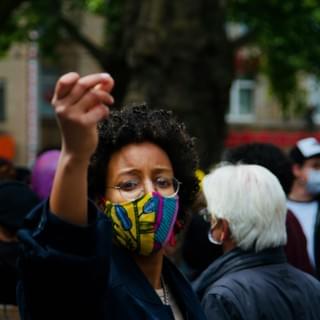
Embodying Liberatory Leadership
Liberatory Leadership is about "deepening self-awareness, deepening a sort of relationship to self...getting clear about [your] own why, getting clear about [your] own deserving, and all of that being sort of a mirror and gateway to understanding other people's humanity, other people's deserving and other people's why.”
— 2021-2022 Praxis Cohort Participant

How do we embody liberatory leadership?
What does it look and feel like in practice?
While there are many ways one can describe liberation, in its simplest terms, liberation is the experience of wholeness, freedom, justice and thriving.
Liberatory leadership invites leaders to operationalize this vision of personal and collective freedom, justice and thriving, through their individual approaches and through their organizations. It necessitates an internal interrogation of how race and power interact with our work.
Liberatory leadership invites us to lead from a place of love and possibility.
Liberatory leaders flow, responding to the people in the space, rather than agendas.
We name tensions, like the one between our desire to be both flowing and stable.
We build alignment between our words and actions by treating staff and partners in the same just ways we strive to create in the world.
We address power differentials in service of justice and center those at the margins within our organizations and our work.
We reflect on, unlearn, and discard relational patterns and models that build power through supremacy, divison and dominance.
We invite in power-building based on community, equity, and self-determination.
We take time to slow down, to make more room to connect with each other, and create space to rest and ground ourselves, to ensure longevity.
We value celebration over competition to explore possibilities that can only emerge in community.
We seek interconnectedness and right-relationship, moving in the will of what's good for the whole and not just the individual.
We honor our knowing, and free ourselves from the obligation to do things that way they've always been prescribed.
We connect to the legacy of freedom fighters and ancestral work across generations, imagining futures of possibility, and of liberation.
We show up as liberatory leaders to free ourselves and others to lead as our authentic, powerful selves.
Examples of organizations and collectives that embody liberatory leadership:
The Liberatory Leadership Map
COMING SOON! A resource that highlights where and how liberatory leadership is practiced builds visibility for the work and creates a digital space for us to learn liberatory practices from each other.
Liberatory Leadership Case Studies
Building on the Liberatory Leadership Map, we interviewed three individuals from organizations featured on the map to deepen our understanding of their liberatory leadership practices. On our resource page, you'll find slides summarizing key learnings from our conversations with Dawn Henderson of Village of Wisdom, Elissa Sloan Perry from Change Elemental, and Blue Lewish From NC BLOC. We hope that these case studies can serve as sources of inspiration for us all as we continue to deepen our commitment to liberatory leadership practices.
© 2021

